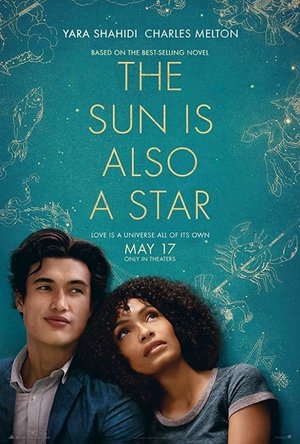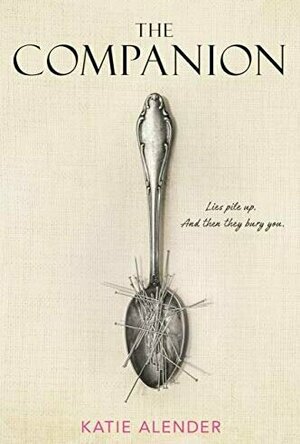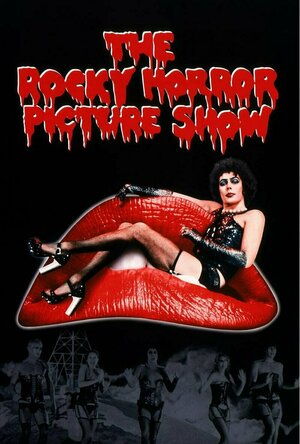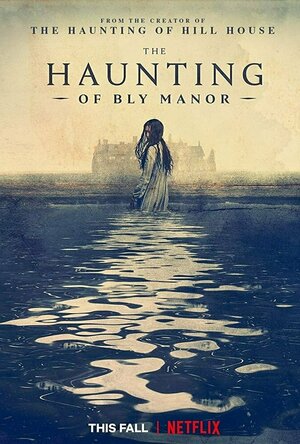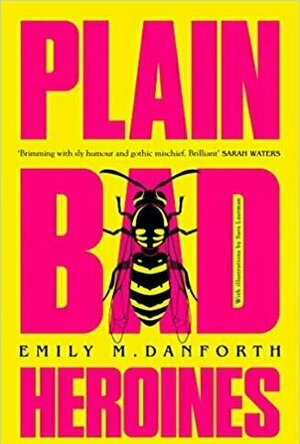Search
Search results
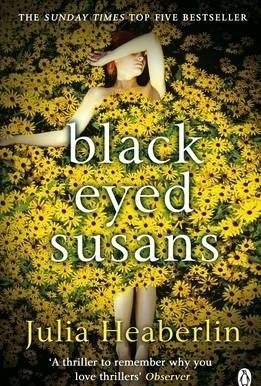
Black-Eyed Susans
Book
**THE TOP 5 SUNDAY TIMES BESTSELLER** 'My book of the year so far. Breathtakingly, heart-stoppingly...
Emma @ The Movies (1786 KP) rated The Sun Is Also A Star (2019) in Movies
Jun 20, 2020
At some point I may get bored of YA adaptations that throw two young people together with a bit of adversity. I'm not saying that this wasn't good but there are other typed of YA books out there that could be done.
After years living in the US, Natasha and her family are a day away from being deported back to Jamaica. She's determined to find a way to have them stay so instead of packing she's off to make one last attempt to stay in the city she loves.
Daniel is about to have the biggest interview of his life, his whole future is resting on it, but he throws all thoughts of it aside when he sees Natasha looking up in a crowd of people ignoring the world. She's a beautiful anomaly in his life and he needs to find her no matter the consequences.
Circumstances bring the two together and Daniel manages to convince her that even an hour with him could change their lives forever.
When I write it down like that the story doesn't sound quite so... magical? Man sees attractive young woman and attempts to stalk her... yeah, slightly creepy, but thankfully the film doesn't feel like that.
Nicola Yoon is two for two with her novels (the first being Everything, Everything) and we've got another lovely film in The Sun Is Also A Star. Of course it's yet another book I haven't read, if only there were a few more hours of leisure time in our lives.
Thinking back on this I find the timeline for the film a little confusing, which is strange considering you know that the majority happens over the space of two days. Perhaps it's because it's a little far fetched, perhaps it's also because they're constantly going from place to place and it seems like more than just a day's worth of activity.
Natasha is played by Yara Shahidi, the only thing I know her from recently is Black-ish, which I love. I had reservations about this casting, actors going from long-running shows into films doesn't always end well, partly because of the different acting style needed and partly from my side and being very familiar with their character. I shouldn't have worried, she does a great job with this role, and it's nice to see a character that doesn't have a typical backstory.
The same can be said for Daniel, played by Riverdale's Charles Melton. Watching his struggle with the path of his life is really interesting and I liked the small flashback to where everything was decided. If we ignore the creepiness of the couple's meeting then Daniel is a nice down to earth character and Melton strikes a nice balance between his home life and his actual life around people he knows.
Together they make a captivating couple on screen, and I like how they're each other's support even though they don't know that much about each other. They have great chemistry and that definitely boosted the enjoyment of the film.
I hardly made any notes when watching this, those that I did were about the nice use of voiceovers (that sounded very much like nature documentary), some good songs at the beginning, and then the intriguing and nice way they ended it. It's an enjoyable watch but I think it's come at the wrong end of the YA adaptation trend, everything is very similar despite having some individual charm.
Originally posted on: https://emmaatthemovies.blogspot.com/2019/08/the-sun-is-also-star-movie-review.html
After years living in the US, Natasha and her family are a day away from being deported back to Jamaica. She's determined to find a way to have them stay so instead of packing she's off to make one last attempt to stay in the city she loves.
Daniel is about to have the biggest interview of his life, his whole future is resting on it, but he throws all thoughts of it aside when he sees Natasha looking up in a crowd of people ignoring the world. She's a beautiful anomaly in his life and he needs to find her no matter the consequences.
Circumstances bring the two together and Daniel manages to convince her that even an hour with him could change their lives forever.
When I write it down like that the story doesn't sound quite so... magical? Man sees attractive young woman and attempts to stalk her... yeah, slightly creepy, but thankfully the film doesn't feel like that.
Nicola Yoon is two for two with her novels (the first being Everything, Everything) and we've got another lovely film in The Sun Is Also A Star. Of course it's yet another book I haven't read, if only there were a few more hours of leisure time in our lives.
Thinking back on this I find the timeline for the film a little confusing, which is strange considering you know that the majority happens over the space of two days. Perhaps it's because it's a little far fetched, perhaps it's also because they're constantly going from place to place and it seems like more than just a day's worth of activity.
Natasha is played by Yara Shahidi, the only thing I know her from recently is Black-ish, which I love. I had reservations about this casting, actors going from long-running shows into films doesn't always end well, partly because of the different acting style needed and partly from my side and being very familiar with their character. I shouldn't have worried, she does a great job with this role, and it's nice to see a character that doesn't have a typical backstory.
The same can be said for Daniel, played by Riverdale's Charles Melton. Watching his struggle with the path of his life is really interesting and I liked the small flashback to where everything was decided. If we ignore the creepiness of the couple's meeting then Daniel is a nice down to earth character and Melton strikes a nice balance between his home life and his actual life around people he knows.
Together they make a captivating couple on screen, and I like how they're each other's support even though they don't know that much about each other. They have great chemistry and that definitely boosted the enjoyment of the film.
I hardly made any notes when watching this, those that I did were about the nice use of voiceovers (that sounded very much like nature documentary), some good songs at the beginning, and then the intriguing and nice way they ended it. It's an enjoyable watch but I think it's come at the wrong end of the YA adaptation trend, everything is very similar despite having some individual charm.
Originally posted on: https://emmaatthemovies.blogspot.com/2019/08/the-sun-is-also-star-movie-review.html
Heather Cranmer (2721 KP) rated The Companion in Books
Jan 8, 2021
I've been a fan of Katie Alender's since I first read her book Bad Girls Don't Die. I haven't read a bad book from her yet, and reading Alender's latest book, The Companion, was no different. I enjoyed reading it.
After losing her parents and two younger sisters in a car accident, Margot is sent to the state institution as she has no other family. There, she has vivid nightmares that leave her screaming at night. The other orphans at the institution call her lucky although Margot isn't sure she'd consider herself lucky. When she is chosen by a rich family to come live with them at their large and gorgeous home, Margot's luck may be changing. However, it doesn't seem like it's for the better. Strange things are happening at Margot's new home. Plus, she's meant to play companion for the sick and mute Agatha. On the plus side, her nightmares have seemed to stop but at what price?
The plot of The Companion was a very strong one and had quite the creepy vibe to it which I thoroughly enjoyed. Everything about about the plot was solid and flowed smoothly. The pacing was superb, and I found myself dying to know what would happen next. In fact, I felt like I was actually part of the narrative the whole time. There are a few plot twists although I felt that most were easy to figure out long before they were revealed. While the majority of The Companion was a great read, the last 100 or so pages let this book down. Margot, the protagonist of the story, seems to lose her brain and common sense towards the ending of the novel. She does some really dumb things that put her life in danger. I had a hard time believing that anyone could be that dumb. Other than that, the rest of the story is really great! Loose ends are tied up by the end of the book. However, I would have liked to know how the flowers grew so quickly by a certain grave, but that's probably just a me thing.
All of the characters in The Companion were fleshed out enough to feel realistic. The only exception was Margot towards the end of the book as stated earlier. She started out so strong and smart, it was kind of a shock to see her dumbed down towards the ending. I had really enjoyed her character and her hunger to find out what was really going on when it came to Agatha as well as what happened to Lily. Agatha was definitely my favorite character. I loved how helpful and strong she tried to be despite what was going on with her. I liked Barrett, but I just wish he would have fought a bit harder to try to help Margot instead of just giving in all the time to his mom. Laura was definitely an interesting character for sure. I enjoyed trying to figure out her story alongside Margot. I felt that Laura was the best written character in The Companion.
Trigger warnings for The Companion include minor violence, death, murder, attempted murder, some heavy kissing, drugging, and gaslighting.
Although the last hundred pages do take away from the book a little, The Companion is still a worthwhile read. It does have an interesting plot and characters and will have you hooked from the very first page. I would recommend The Companion by Katie Alender to those aged 13+ who love a suspenseful story.
After losing her parents and two younger sisters in a car accident, Margot is sent to the state institution as she has no other family. There, she has vivid nightmares that leave her screaming at night. The other orphans at the institution call her lucky although Margot isn't sure she'd consider herself lucky. When she is chosen by a rich family to come live with them at their large and gorgeous home, Margot's luck may be changing. However, it doesn't seem like it's for the better. Strange things are happening at Margot's new home. Plus, she's meant to play companion for the sick and mute Agatha. On the plus side, her nightmares have seemed to stop but at what price?
The plot of The Companion was a very strong one and had quite the creepy vibe to it which I thoroughly enjoyed. Everything about about the plot was solid and flowed smoothly. The pacing was superb, and I found myself dying to know what would happen next. In fact, I felt like I was actually part of the narrative the whole time. There are a few plot twists although I felt that most were easy to figure out long before they were revealed. While the majority of The Companion was a great read, the last 100 or so pages let this book down. Margot, the protagonist of the story, seems to lose her brain and common sense towards the ending of the novel. She does some really dumb things that put her life in danger. I had a hard time believing that anyone could be that dumb. Other than that, the rest of the story is really great! Loose ends are tied up by the end of the book. However, I would have liked to know how the flowers grew so quickly by a certain grave, but that's probably just a me thing.
All of the characters in The Companion were fleshed out enough to feel realistic. The only exception was Margot towards the end of the book as stated earlier. She started out so strong and smart, it was kind of a shock to see her dumbed down towards the ending. I had really enjoyed her character and her hunger to find out what was really going on when it came to Agatha as well as what happened to Lily. Agatha was definitely my favorite character. I loved how helpful and strong she tried to be despite what was going on with her. I liked Barrett, but I just wish he would have fought a bit harder to try to help Margot instead of just giving in all the time to his mom. Laura was definitely an interesting character for sure. I enjoyed trying to figure out her story alongside Margot. I felt that Laura was the best written character in The Companion.
Trigger warnings for The Companion include minor violence, death, murder, attempted murder, some heavy kissing, drugging, and gaslighting.
Although the last hundred pages do take away from the book a little, The Companion is still a worthwhile read. It does have an interesting plot and characters and will have you hooked from the very first page. I would recommend The Companion by Katie Alender to those aged 13+ who love a suspenseful story.
Sarah (7800 KP) rated The Rocky Horror Picture Show (1975) in Movies
Nov 25, 2020
Gloriously kitsch
Film #4 on the 100 Movies Bucket List: The Rocky Horror Picture Show
The Rocky Horror Picture Show is a bonafide cult classic and I doubt there is anyone who would disagree with this. It flopped on first release at the cinema but soon after gained a massive cult following and became a hugely interactive musical experience. For me, I became part of this cult following at university and have attended a fair few parties and shows over the years (in fancy dress of course). However it’s been quite some time since I watched this and seeing it again now makes for a rather interesting watch.
The Rocky Horror Picture Show is a 1975 musical directed by Jim Sharman, spanning a multitude of genres. It follows newly engaged (and rather wholesome) couple Brad (Barry Bostwick) and Janet (Susan Sarandon) as a flat tyre leaves them stranded and they’re left to seek shelter in a nearby castle owned by Dr Frank-N-Furter (Tim Curry).
This film is undoubtedly bats**t crazy. The plot is absolutely bonkers – a group of aliens from the planet Transexual led by a mad scientist in his quest to make the perfect man. It spans so many genres from comic horror to glam-rock musical and everything in between. It’s aim to spoof old school science fiction films is spot on, and there isn’t many films that can pull off cannibalism, murder and erotic sexual experimentation in the same 2 hour run time.
Admittedly there are some aspects of the plot that haven’t quite stood the test of time. 45 years ago the freedom exhibited around gender and sexuality was unlike anything anyone had ever seen and is still a rather wonderful thing to watch. However, there are other sides to this (such as lack of consent) which have become more apparent as society evolves and maybe aren’t quite acceptable now as they were back then. Fortunately this doesn’t spoil the overall feel of the film and it’s still as camp and cheesy and kitsch as it ever was.
One of the reasons for this films success is Richard O Brien’s script and music, and his performance as Riff Raff is pretty creepy and fun too. It’s clever and smart, and the music is top notch. The songs are some of the most catchy I’ve ever heard and they make you forget how crazy the plot is as soon as the music starts. From the legendary Time Warp to the wonderful Meat Loaf cameo on Hot Patootie, to the incredibly moving and inspirational Don’t Dream It, Be It, the songs are hugely memorable.
And then you have Tim Curry as Frank-N-Furter, in an absolute standout performance. He is perfect in Frank (I’ve yet to see anyone do it better) and it’s probably the best role he’s ever had. He looks like he’s having so much fun and steals every scene, you can’t take your eyes off him and that’s not just because he’s in stockings and suspenders. He makes you feel fascinated by Frank, disgusted and then ultimately sorry for him and this is no mean feat. No disrespect to the rest of the cast, but when Curry isn’t on screen the film does suffer ever so slightly.
The Rocky Horror Picture Show is a wacky, campy riot of a musical with a message that is heartwarming and inclusive. It may have aged a little over the years and certain topics don’t scrub up quite as well, but it’s still a hugely entertaining and unique musical experience.
The Rocky Horror Picture Show is a bonafide cult classic and I doubt there is anyone who would disagree with this. It flopped on first release at the cinema but soon after gained a massive cult following and became a hugely interactive musical experience. For me, I became part of this cult following at university and have attended a fair few parties and shows over the years (in fancy dress of course). However it’s been quite some time since I watched this and seeing it again now makes for a rather interesting watch.
The Rocky Horror Picture Show is a 1975 musical directed by Jim Sharman, spanning a multitude of genres. It follows newly engaged (and rather wholesome) couple Brad (Barry Bostwick) and Janet (Susan Sarandon) as a flat tyre leaves them stranded and they’re left to seek shelter in a nearby castle owned by Dr Frank-N-Furter (Tim Curry).
This film is undoubtedly bats**t crazy. The plot is absolutely bonkers – a group of aliens from the planet Transexual led by a mad scientist in his quest to make the perfect man. It spans so many genres from comic horror to glam-rock musical and everything in between. It’s aim to spoof old school science fiction films is spot on, and there isn’t many films that can pull off cannibalism, murder and erotic sexual experimentation in the same 2 hour run time.
Admittedly there are some aspects of the plot that haven’t quite stood the test of time. 45 years ago the freedom exhibited around gender and sexuality was unlike anything anyone had ever seen and is still a rather wonderful thing to watch. However, there are other sides to this (such as lack of consent) which have become more apparent as society evolves and maybe aren’t quite acceptable now as they were back then. Fortunately this doesn’t spoil the overall feel of the film and it’s still as camp and cheesy and kitsch as it ever was.
One of the reasons for this films success is Richard O Brien’s script and music, and his performance as Riff Raff is pretty creepy and fun too. It’s clever and smart, and the music is top notch. The songs are some of the most catchy I’ve ever heard and they make you forget how crazy the plot is as soon as the music starts. From the legendary Time Warp to the wonderful Meat Loaf cameo on Hot Patootie, to the incredibly moving and inspirational Don’t Dream It, Be It, the songs are hugely memorable.
And then you have Tim Curry as Frank-N-Furter, in an absolute standout performance. He is perfect in Frank (I’ve yet to see anyone do it better) and it’s probably the best role he’s ever had. He looks like he’s having so much fun and steals every scene, you can’t take your eyes off him and that’s not just because he’s in stockings and suspenders. He makes you feel fascinated by Frank, disgusted and then ultimately sorry for him and this is no mean feat. No disrespect to the rest of the cast, but when Curry isn’t on screen the film does suffer ever so slightly.
The Rocky Horror Picture Show is a wacky, campy riot of a musical with a message that is heartwarming and inclusive. It may have aged a little over the years and certain topics don’t scrub up quite as well, but it’s still a hugely entertaining and unique musical experience.
Fred (860 KP) rated The Haunting of Bly Manor in TV
Oct 11, 2020
Yet another re-telling of The Turn of the Screw
This is a re-telling of The Turn of the Screw by Henry James, written in 1898. The last re-telling was 2020s The Turning, which was terrible. So how is this version?
In the last episode of this series, a character says, "This wasn't a ghost story, it was a love story." which is true. Sort of. It's a ghost story in the fact that it has ghosts in it. It's a love story in that two people fall in love. But it's really all about the characters. They are very good characters & acted out very well. I'll even give Henry Thomas credit for trying a British accent, even if his face contorted like someone was running a current through his face every time he talked. Entire episodes are sometimes devoted to a character. And this is the main problem. It's fine to give some character development, but this series is so stretched out. It's 9 episodes that could have been 3 or 4 episodes and worked out much better. Each person's story also jumps back in time, then forward, then back, then back again, then forward, then back. It's pacing can be real bad & quite frankly can be real boring at times.
Sometimes I think how can this story be remade 35 times now & still there's no great film version. It's a good story. It's an interesting idea. But, it's also weird & sometimes confusing & sometimes all over the place. It's got to be tight, but it's also got to be fleshed out enough that we care about the characters. Which as I said, is what it's all about.
Now, is it a ghost story? I already said yes. Is it a horror series? Well, I would say no. It's not scary. It's not creepy. It doesn't even have jump scares, which is normally good, but I would have enjoyed one or two to be honest. What it does have, as I've stated, is characters. But it also has atmosphere & great settings. The manor itself is almost it's own character. But as much as it is dark & there are things hiding in the corners or even in plain sight, it's just doesn't have that creep factor. Even the little girl shushes a ghost when it won't shut up. There's no sense of real evil or malevolence going on.
Now it sounds like I hated this series, but I didn't. I liked it. It was not what I expected, being the second season of the anthology "The Haunting" series, which started with the phenomenal "The Haunting of Hill House". But, if it had been just like Hill House, I probably would have been bored & just re-watched the first season again. So, I'm glad it was different. But like I said, it was stretched out far longer than it should have been.
Now, after we watched the entire series, my wife said that she liked it & would re-watch it maybe in 5 years. and gives it a 6 out of 10 as well. I'm sure a re-watch would be good for seeing things you did not catch the first time, but feel it'd be better to move on to something different. If you're looking for something scary to watch this Halloween series, then you can skip this. Unless you're in the mood to watch some good actors, playing good characters, with an interesting movie & have lots of free time. However, if you didn't see the first season "Hill House", then watch that instead.
In the last episode of this series, a character says, "This wasn't a ghost story, it was a love story." which is true. Sort of. It's a ghost story in the fact that it has ghosts in it. It's a love story in that two people fall in love. But it's really all about the characters. They are very good characters & acted out very well. I'll even give Henry Thomas credit for trying a British accent, even if his face contorted like someone was running a current through his face every time he talked. Entire episodes are sometimes devoted to a character. And this is the main problem. It's fine to give some character development, but this series is so stretched out. It's 9 episodes that could have been 3 or 4 episodes and worked out much better. Each person's story also jumps back in time, then forward, then back, then back again, then forward, then back. It's pacing can be real bad & quite frankly can be real boring at times.
Sometimes I think how can this story be remade 35 times now & still there's no great film version. It's a good story. It's an interesting idea. But, it's also weird & sometimes confusing & sometimes all over the place. It's got to be tight, but it's also got to be fleshed out enough that we care about the characters. Which as I said, is what it's all about.
Now, is it a ghost story? I already said yes. Is it a horror series? Well, I would say no. It's not scary. It's not creepy. It doesn't even have jump scares, which is normally good, but I would have enjoyed one or two to be honest. What it does have, as I've stated, is characters. But it also has atmosphere & great settings. The manor itself is almost it's own character. But as much as it is dark & there are things hiding in the corners or even in plain sight, it's just doesn't have that creep factor. Even the little girl shushes a ghost when it won't shut up. There's no sense of real evil or malevolence going on.
Now it sounds like I hated this series, but I didn't. I liked it. It was not what I expected, being the second season of the anthology "The Haunting" series, which started with the phenomenal "The Haunting of Hill House". But, if it had been just like Hill House, I probably would have been bored & just re-watched the first season again. So, I'm glad it was different. But like I said, it was stretched out far longer than it should have been.
Now, after we watched the entire series, my wife said that she liked it & would re-watch it maybe in 5 years. and gives it a 6 out of 10 as well. I'm sure a re-watch would be good for seeing things you did not catch the first time, but feel it'd be better to move on to something different. If you're looking for something scary to watch this Halloween series, then you can skip this. Unless you're in the mood to watch some good actors, playing good characters, with an interesting movie & have lots of free time. However, if you didn't see the first season "Hill House", then watch that instead.
Kristy H (1252 KP) rated Plain Bad Heroines in Books
Dec 17, 2020
Plain Bad Heroines was one of my most anticipated reads of the year. I am a sucker for a lesbian tale. Add in a Gothic New England boarding school for girls? Sold.
The story centers around two time periods. The first, 1902, at the Brookhants School for Girls, run by Libbie Brookhants. A book by a young writer, Mary MacLane has come out--one that's incredibly scandalous for the times. Two Brookhants girls, Flo and Clara, are obsessed with it and establish The Plain Bad Heroine Society. The two are in love, meeting in secret--until they are attacked by yellow jackets at their hiding spot, a copy of the book found with them. A few years later the school closes, but not until after more scandal and death. Now, our second period, over a hundred years later, where Merritt Emmons, a young writer, publishes a book about Flo and Clara's story. It inspires a horror film starring Harper Harper, a famous lesbian actress. Harper will be playing Flo and B-list actress Audrey Wells, Clara. Filming on-site at the abandoned Brookhants site, the three women converge. But soon, weird things start happening, and the curse of Brookhants seems back to haunt the set--and our three modern-day heroines.
This book is absolutely enthralling at times. I flew through these 619 pages, that's for sure. My notes state "very lesbian," which is, of course, a major plus for me. Believe me, we don't get a lot of books starring ourselves. And you know, where we are killed off by swarms of yellow jackets. I honestly found both storylines compelling. It's hard not to fall a bit in love with Harper Harper, the charismatic celebrity (out!) lesbian. And 1902 isn't just about Clara and Flo, but Libbie Brookhants and her life trying to run a cursed school in the early 1900s. Honestly, the pages really flew by most of the time. Though, there are certainly moments where I felt some of the story could have been cut.
And yes, the narrative style is different, though it really adds to the uniqueness of the book. It's basically told by an omnipresent narrator, talking directly to the reader. There are footnotes, often humorous ones, and the end result is something you don't often find. For the most part, I felt like Danforth pulled it off, too. I do think Libbie was a little more fully developed than Merritt, Harper, and Audrey, but that also may have been because that trio could come across as a bit spoiled at times.
Probably my two biggest issues with this book (regretfully): for a Gothic horror novel, it's not really that scary. There are a few creepy and eerie moments, especially in the beginning, but it never really builds up to that terrifying moment that you're expecting. And, somewhat related, the ending. We read and stick with our various tales for the entire time and then... poof! Everything just fizzles out. I was so bummed. The ending was such a disappointment after all I'd read and kept this from being a full-fledged 4 or 4.5-star read. I couldn't believe it after what we'd been through. It was like even the author was tired.
So, overall, this is an original and fascinating read. I'm certainly still advising you to read it (especially if you're queer or enjoy reading queer fiction). Just be prepared that the ending may not have that big scary moment you're expecting. 3.5 stars.
The story centers around two time periods. The first, 1902, at the Brookhants School for Girls, run by Libbie Brookhants. A book by a young writer, Mary MacLane has come out--one that's incredibly scandalous for the times. Two Brookhants girls, Flo and Clara, are obsessed with it and establish The Plain Bad Heroine Society. The two are in love, meeting in secret--until they are attacked by yellow jackets at their hiding spot, a copy of the book found with them. A few years later the school closes, but not until after more scandal and death. Now, our second period, over a hundred years later, where Merritt Emmons, a young writer, publishes a book about Flo and Clara's story. It inspires a horror film starring Harper Harper, a famous lesbian actress. Harper will be playing Flo and B-list actress Audrey Wells, Clara. Filming on-site at the abandoned Brookhants site, the three women converge. But soon, weird things start happening, and the curse of Brookhants seems back to haunt the set--and our three modern-day heroines.
This book is absolutely enthralling at times. I flew through these 619 pages, that's for sure. My notes state "very lesbian," which is, of course, a major plus for me. Believe me, we don't get a lot of books starring ourselves. And you know, where we are killed off by swarms of yellow jackets. I honestly found both storylines compelling. It's hard not to fall a bit in love with Harper Harper, the charismatic celebrity (out!) lesbian. And 1902 isn't just about Clara and Flo, but Libbie Brookhants and her life trying to run a cursed school in the early 1900s. Honestly, the pages really flew by most of the time. Though, there are certainly moments where I felt some of the story could have been cut.
And yes, the narrative style is different, though it really adds to the uniqueness of the book. It's basically told by an omnipresent narrator, talking directly to the reader. There are footnotes, often humorous ones, and the end result is something you don't often find. For the most part, I felt like Danforth pulled it off, too. I do think Libbie was a little more fully developed than Merritt, Harper, and Audrey, but that also may have been because that trio could come across as a bit spoiled at times.
Probably my two biggest issues with this book (regretfully): for a Gothic horror novel, it's not really that scary. There are a few creepy and eerie moments, especially in the beginning, but it never really builds up to that terrifying moment that you're expecting. And, somewhat related, the ending. We read and stick with our various tales for the entire time and then... poof! Everything just fizzles out. I was so bummed. The ending was such a disappointment after all I'd read and kept this from being a full-fledged 4 or 4.5-star read. I couldn't believe it after what we'd been through. It was like even the author was tired.
So, overall, this is an original and fascinating read. I'm certainly still advising you to read it (especially if you're queer or enjoy reading queer fiction). Just be prepared that the ending may not have that big scary moment you're expecting. 3.5 stars.

Build With Grandpa
Education and Games
App
Demolish an old building with a wrecking ball, clear the lot with a bulldozer - then design, build,...

Grandpa's Toy Shop
Education and Games
App
Design, build, and decorate ten different kinds of toys to sell in Grandpa's Toy Shop! After you use...
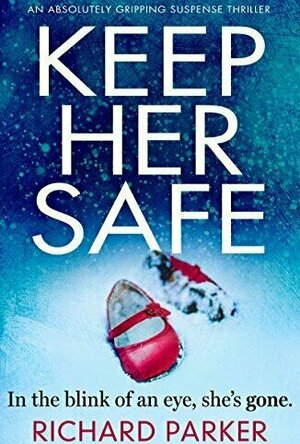
Keep Her Safe
Book
In the blink of an eye, she's gone. Maggie’s daughter Penny is her whole world… and she’d do...
Bob Mann (459 KP) rated The Circle (2017) in Movies
Sep 29, 2021
Social Media involvement in political manipulation? Don’t be ridiculous!
Set in the near future “The Circle” tells a horror story of the social media age involving an omnipotent American corporate, pitched somewhere between being Facebook-like and Google-like (note, lawyers, I just said “like”!) Emma Watson (“Beauty and the Beast“) plays young intern Mae who, partly through the aid of family friend Annie (Karen Gillan, “Guardians of the Galaxy“, “Doctor Who”) but mostly through her own aptitude, lands a foothold job in customer services for the company. With the lush corporate campus fast becoming home, Mae is quickly singled out as having “executive potential” by the charismatic CEO Bailey (Tom Hanks, “Bridge of Spies“) and his more taciturn sidekick Stenton (US comedian Patton Oswalt).
Progressively brainwashed into believing the company’s intrusive snooping (a favourite motto is “Secrets are Lies”) is all for ‘the greater good’, Mae champions the cause until a tragedy rocks her world and her company beliefs to the core.
Whenever I watch a film I tend to form my own opinion first before checking out what the ‘general public’ on IMDB think. In this case, I must confess to being a bit surprised at our divergence of views: a lot of people clearly hated this movie whereas I confess that I found it very entertaining. Certainly with the alleged role of Russia in influencing elections around the world via social media, the film is most certainly topical! Many reviewers seemed quite upset that Watson’s character is such a ‘doormat’, in that her views are so easily manipulated by the corporate machine. But not every woman – as indeed every man – can or should be a Joan of Arc style role model in every film: why should they be?
I actually found her indoctrination into “the Circle way” as quite convincing, especially a creepy scene where two corporate lackies (Cho Smith and Amir Talai) say that they’re not checking up on Mae’s social life, but…. Watson enjoys extending her post-Potter repertoire well, but the talented John Boyega (“Star Wars: The Force Awakens“) is completely wasted in his role as Ty; the Wozniak-like genious behind The Circle’s technology. The script gives him very little to do other than stand around and look grumpy.
A wasted John Boyega with Emma Watson.
The film is sad in being the last movie appearance of the great Bill Paxton (“Apollo 13”) who plays Mae’s sick father and who died of complications following heart surgery two months before the film’s release (the film is dedicated “For Bill”). Tragically, Mae’s mother in the film, actress Glenn Headly (“Dirty Rotten Scoundrels”) also died suddenly at the age of 62, also due to heart problems, a couple of months after the film’s release. It’s surprising the film doesn’t have a “curse of The Circle” tag on it.
The film was directed by James Ponsoldt, who also wrote the screenplay with novel-writer Dave Eggers (“Away We Go”). I particularly liked the on-screen use of captioning (posts) which was reminiscent to me of last year’s “Nerve“, a B-movie film I rated highly that also had a string social media theme.
While the ending of the film is a bit twee – a movie definition of “being hoisted by your own petard” – it’s overall a thought provoking piece sufficiently close to the truth as to where society is going to raise the hairs on your neck.
Progressively brainwashed into believing the company’s intrusive snooping (a favourite motto is “Secrets are Lies”) is all for ‘the greater good’, Mae champions the cause until a tragedy rocks her world and her company beliefs to the core.
Whenever I watch a film I tend to form my own opinion first before checking out what the ‘general public’ on IMDB think. In this case, I must confess to being a bit surprised at our divergence of views: a lot of people clearly hated this movie whereas I confess that I found it very entertaining. Certainly with the alleged role of Russia in influencing elections around the world via social media, the film is most certainly topical! Many reviewers seemed quite upset that Watson’s character is such a ‘doormat’, in that her views are so easily manipulated by the corporate machine. But not every woman – as indeed every man – can or should be a Joan of Arc style role model in every film: why should they be?
I actually found her indoctrination into “the Circle way” as quite convincing, especially a creepy scene where two corporate lackies (Cho Smith and Amir Talai) say that they’re not checking up on Mae’s social life, but…. Watson enjoys extending her post-Potter repertoire well, but the talented John Boyega (“Star Wars: The Force Awakens“) is completely wasted in his role as Ty; the Wozniak-like genious behind The Circle’s technology. The script gives him very little to do other than stand around and look grumpy.
A wasted John Boyega with Emma Watson.
The film is sad in being the last movie appearance of the great Bill Paxton (“Apollo 13”) who plays Mae’s sick father and who died of complications following heart surgery two months before the film’s release (the film is dedicated “For Bill”). Tragically, Mae’s mother in the film, actress Glenn Headly (“Dirty Rotten Scoundrels”) also died suddenly at the age of 62, also due to heart problems, a couple of months after the film’s release. It’s surprising the film doesn’t have a “curse of The Circle” tag on it.
The film was directed by James Ponsoldt, who also wrote the screenplay with novel-writer Dave Eggers (“Away We Go”). I particularly liked the on-screen use of captioning (posts) which was reminiscent to me of last year’s “Nerve“, a B-movie film I rated highly that also had a string social media theme.
While the ending of the film is a bit twee – a movie definition of “being hoisted by your own petard” – it’s overall a thought provoking piece sufficiently close to the truth as to where society is going to raise the hairs on your neck.
